

China Daily launched Vision China in 2018 to play its role as a bridge for communication between China and the rest of the world. Focusing on developments in both China and abroad, Vision China invites well-known Chinese and overseas opinion leaders to give talks and share their ideas on forums focusing on a wide range of topics.
Nov 6, 2023 – "Leading to the Future with Technological Innovation", Wuhan, Hubei province
Oct 13, 2023 – "Youth Generation: Powering the future of the Belt and Road", Taicang, Jiangsu province
July 13, 2023 – "Tracing the origins of Chinese civilization and passing it on to future generations", Chaoyang, Liaoning province
May 18, 2023 – "Intelligence: Extensive development space, sustainable growth driver", Tianjin
"Thriving digital economy is a new drive for global growth," said Jan Bongaerts, senior vice-president of Yangtze Optical Fiber and Cable Joint Stock Limited Company, adding that fiber networks accelerate the digital transformation and serve as the foundation for almost everything we do in this era.
"If you come to China now, you'll see we have more patents, more trademarks, more enforcement actions than anywhere else in the world." said Fan Zhiyong, vice president and head of intellectual property department of Huawei at Vision China.
"Competitiveness is no longer determined by only product and price," said David Zhu, partner and leader of digital transformation service of Roland Berger China, adding that customers want more, such as fast delivery and green production process. Companies are facing an inflection point and it is opportunity now for differentiation.
Speaking at the latest Vision China event, Australian immunologist Charles Mackay emphasized the urgent need for innovative and safe drugs to combat immune-related diseases. He is also the honorary president of School of Pharmaceutical Sciences of Qilu University of Technology in Shandong.
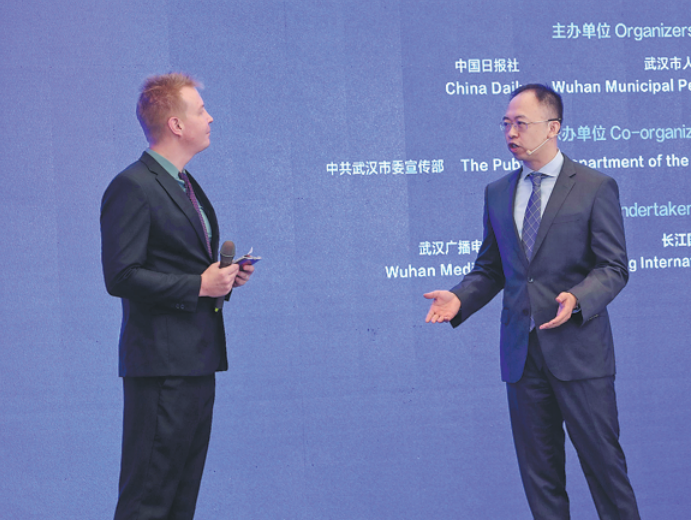
While working closely with partners around the world to lead in innovation, technology companies also need to help them protect their intellectual property, according to Huawei's vice-president.
Technology companies are no longer just a dozen titans. Instead, there are countless small and medium-sized enterprises in the sector from every corner of the world, and Huawei has been working with them to make customized solutions, which the company is very proud of, Fan Zhiyong, vice-president and head of the intellectual property and legal affairs department at Huawei Technologies, said on Monday.
"Our engineers in China will not be effective in writing a program to manage traffic in Sao Paulo. That must be done by some Brazilian software developers. We are pretty good at providing advanced hardware and artificial intelligence models to make their job possible. Digitalization of industries requires global innovation. There's no alternative," Fan said while delivering a speech at Vision China in Wuhan, Hubei province.
The event was themed "Leading to the Future with Technological Innovation".
The globalization of innovation has changed the landscape of intellectual property protection, he said at the event jointly held by China Daily and the Wuhan People's Government.
"As Huawei shares its technologies with the community of 4.6 million developers globally, protecting the company's intellectual property is of paramount importance. However, what I recognize becoming more challenging and important is that our local developers must be able to protect their intellectual property too," he added.
He added that many of those companies are startups that have fewer resources and are vulnerable to intellectual property infringement, but they can be based anywhere in the world. If their work is copied by their competitors, they would have no future, and Huawei would have no future.
"In the past, protecting intellectual property was mainly about a few big and developed countries, where the largest technology companies are. But now, intellectual property protection must be enforced globally," he said.
China now has specialized courts for intellectual property disputes, administrative proceedings designed to adjudicate such disputes in three months, and mediation centers throughout the country. And because of the country's continuous improvements in intellectual property protection, many advanced technologies have been developed in China, Fan said.
"My company took a chance and became a leading technology company, and we are not alone in China. In this new world of global innovation, the same success can take place in any country where there's good intellectual property protection," he said.
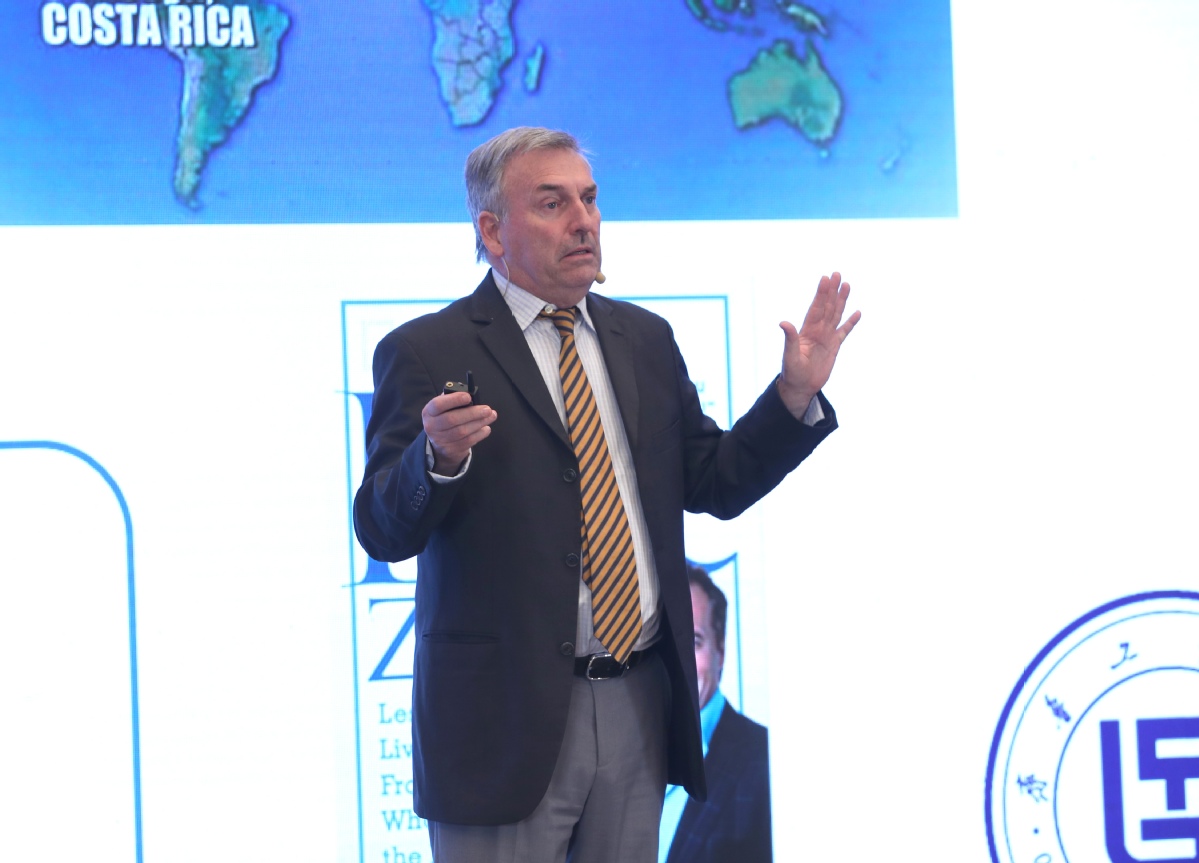
Unhealthy lifestyles and dietary habits are posing a growing threat to human health, leading to a surge in lifestyle diseases, warned Charles Mackay, a renowned scientist and fellow of the Australian Academy of Science.
Speaking at a Vision China event in Wuhan, Hubei province, Mackay emphasized the urgent need for innovative and safe drugs to combat immune-related diseases, including Alzheimer's, cardiovascular conditions and diabetes.
Mackay, honorary president of the School of Pharmaceutical Sciences at Qilu University of Technology in Shandong province, and former chief scientific officer for inflammation and immunology at pharmaceutical company Pfizer in the United States, warned of the detrimental impact of modern lifestyles on global well-being.
He highlighted the critical role that dietary choices play in determining human health outcomes, drawing from research on longevity zones worldwide.
According to Mackay, embracing diets rich in dietary fiber, such as vegetables and nuts, while maintaining control over calorie and sugar intake, can significantly benefit one's health. He further advocated the use of metabolite diets, which focus on the combined effects of various dietary components, over single-molecule drugs.
Mackay concluded his speech by expressing his optimistic outlook on the future of disease treatment. He believes that the scientific community is on the brink of a revolution in healthcare, wherein innovative medicines will be developed to effectively address a range of diseases, ultimately leading to improved human health and well-being.

China is on the path to becoming a generator of technologies rather than a service provider, and that's why foreign businesses invest in high tech, according to a British entrepreneur whose family has done business in China for nearly 150 years.
Simon Haworth, a British entrepreneur and investor involved in the biotechnology and agritech markets, said at a Vision China event in Wuhan, Hubei province, on Monday that he has high hopes for his own forays into China.
Haworth visited Wuhan for the first time in 2012 and later established a biotech company in the city that seeks to use artificial intelligence to understand disease biology, thus enabling the company to discover new drugs.
He appreciated the help from his Chinese business partners who showed him the potential of Wuhan, which he knew nothing about previously.
"The most important thing we should be focusing on with all our policies is establishing one-to-one connection between individuals, and that can start from our children," he said.
He added that one-to-one connection has made a massive difference in delivering help and understanding for all sorts of issues in very practical terms.
The business ties between Haworth's family and China started with a suggestion from a business partner, Haworth said at the event held by China Daily and the Wuhan People's Government.
"My great-great-grandfather met someone in Manchester who was from Jardine Matheson international firm, and they were looking at switching from the cotton trade to the silk trade. And next thing we're importing silk from Jiangsu," said Haworth.
When he took his eldest son to China, he became the sixth generation in a continuous line to engage with China.
His grandparents visited Wuhan in 1963. The family has a video of them being shown the first bridge over the Yangtze River, which had been built a few years earlier, he said.
Besides biotechnology, Haworth believes the agritech market has great potential in the future as it will do more for human health than biotech in the years ahead.
"It's absolutely right that China is not a service provider. China needs to be the owner, participator and generator of technology," he said.
With the new vision in mind, Haworth is confident about starting the new chapter of his family's story with China.
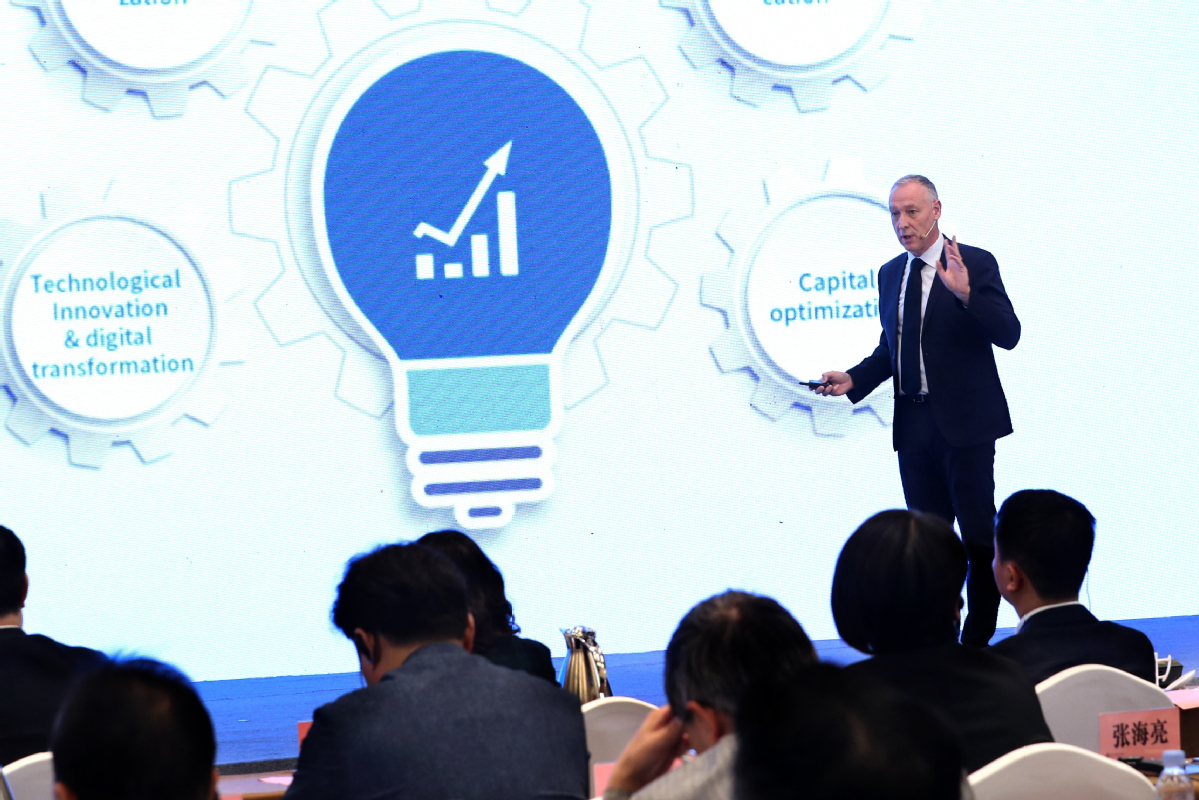
Yangtze Optical Fibre and Cable Joint Stock Limited Company, a global leader in optical communication, is bolstering the development of the optoelectronics industry and helping build Wuhan, Hubei province, into a technological innovation hub.
Jan Bongaerts, senior vice-president of the company, said its optical fiber networks have advantages such as large transmission capacity, ultralow latency and cover a long distance, and are of vital importance in accelerating digital transformation in industries including logistics, transportation, healthcare, mining and education.
Bongaerts said the explosive growth of remote working, cloud gaming, artificial intelligence and virtual reality, especially during the COVID-19 pandemic, increased demand for bandwidth and optical fiber.
The digital economy is thriving as a major driver of GDP growth in many countries, and optical fiber networks are regarded as the best choice for digital economy infrastructure.
"We are very active in telecom and data centers, submarine cables and recently also in semiconductors," Bongaerts said.
Established in 1988 in Wuhan, the company saw its revenue reach $2.01 billion last year. It has more than 10,000 employees and has offered products and services to over 90 countries and regions.
The company has been instrumental in the early stages of developing China's communication network. It has supplied 40 percent of the fiber optic cables utilized in the construction of China's vast communication network, Bongaerts said, adding the company has mastered three key technologies for manufacturing optical fibers.
He underlined that the company is striving to promote technological innovation and advance the development of a globally competitive optical communication industry cluster within the Optics Valley of China in Wuhan.
In 2017, it established the world's largest, most technologically advanced facility for optical fiber in Qianjiang, Hubei province.
In addition, it has stepped up its push to expand in overseas markets. It has six overseas production bases for cable and fiber and over 50 offices abroad, in an effort to export innovative solutions and advanced technologies to the world and to build a high-quality optical fiber network to enhance digital connectivity and enrich the digital lifestyle.
Looking ahead, Bongaerts said the company remains committed to innovation and growth, aiding the city in its quest to become a significant center for technology innovation in China.
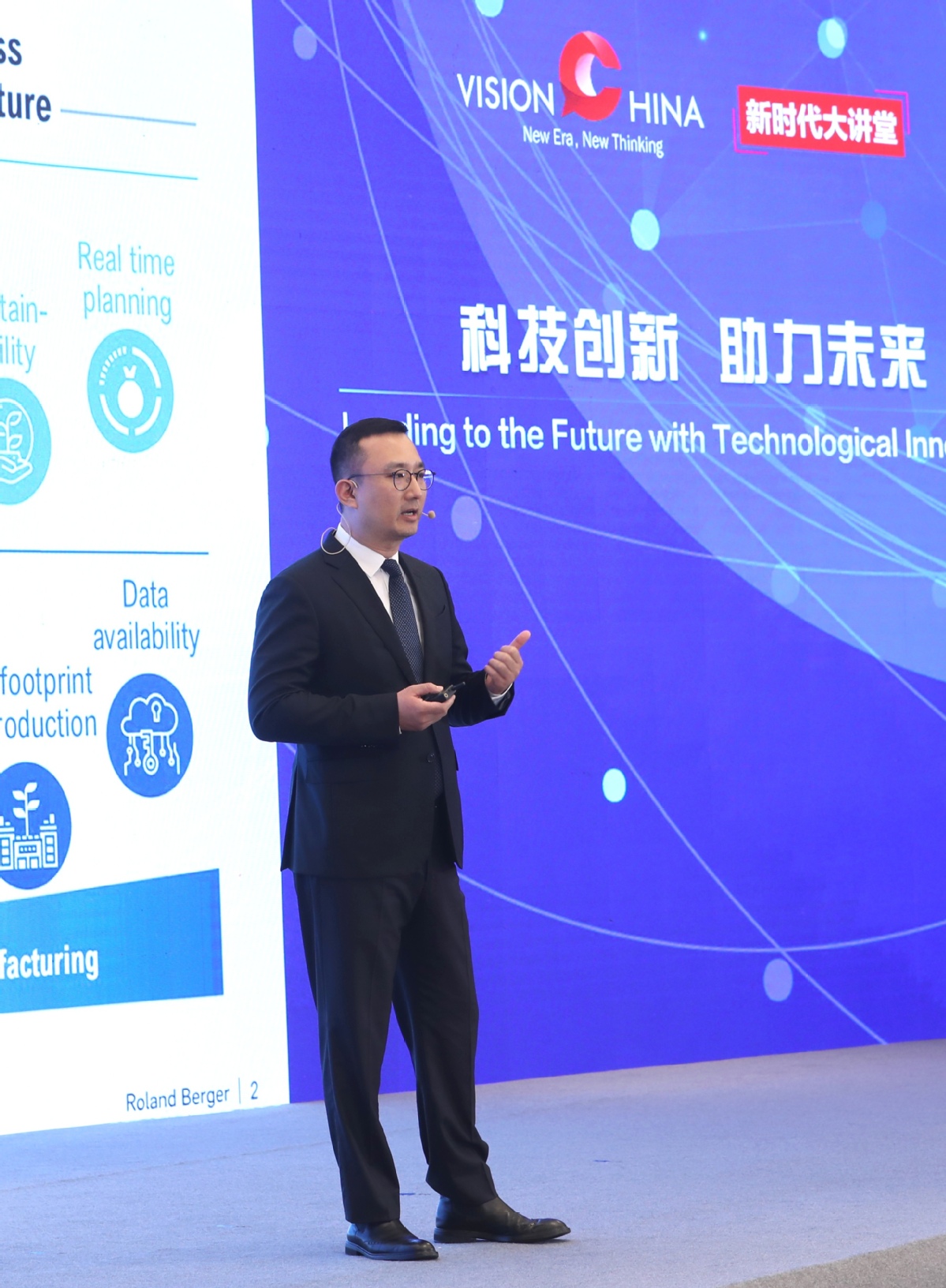
Competitiveness is no longer determined only by products and cost, and some new trends in manufacturing can help boost a company's competitiveness, David Zhu, partner and leader of digital transformation services at Roland Berger China, said during the latest Vision China event held in Wuhan, Hubei province, on Monday.
He said customers now care about carbon footprints, and they demand a technology shift from fuel-powered to battery-powered products.
Customers want de-risked, short supply chains and personalized products. In addition, customers and governments favor brands and products with local heritage, and customers demand shorter lead times and real-time manufacturing status, Zhu said.
"The demand of customers has opened a window for companies to differentiate their manufacturing. Companies could set up a carbon-neutral production facility, and shift the production workforce skill set toward battery and electrical production processes," Zhu said.
For example, with its first fully electric sports car, Porsche made its Taycan production facility in Zuffenhausen, Germany, fully carbon neutral.
Customers are looking for environmentally friendly practices, and Porsche has shown competitive advantages from brand perception and encouraging sustainability, he said.
In addition, enterprises could adopt local or regional manufacturing strategies to stay close with customers. Companies could also upgrade their manufacturing with 3D printing or highly flexible production machines.
For instance, with the adoption of resin-based 3D printing technology, Switzerland-based Sonova Holding, the world's biggest hearing solutions provider, has been on the forefront of on-demand customized hearing-aid production.
Digital manufacturing processes have eliminated the traditional time-consuming handcrafting process, and Sonova has competitive advantages in the mass customization of hearing aids, Zhu said.
Meanwhile, companies could establish their manufacturing in locally favored places. Companies could also link sales and manufacturing in planning, and connect shop-floor manufacturing with live data, Zhu noted in his speech.
Thus, companies face an inflection point, as they either address the trends and boost manufacturing competitiveness or run the risk of a creeping loss of competitiveness.
"Companies must carefully design the road maps, and consider both customer perception and competitors' moves. If done well, manufacturing can turn from a perceived liability into a true asset," Zhu said.
"We are pushing on an open door," said Simon Haworth, a British entrepreneur and investor in biotechnology and agritech at Vision China, adding that China needs to be the owner, participator and generator of technology.

Tech: Experts highlight globalization of innovation
A wide range of scientific and technological exchanges and cooperation both in China and across the world were highlighted at the Vision China event on Monday in the sci-tech powerhouse of Wuhan in Central China's Hubei province.
Under the theme "Leading to the Future with Technological Innovation", Vision China sought to highlight the crucial role of science and technology in contributing to the country's next stage of development.
At the event, hosted jointly by China Daily and Wuhan Municipal People's Government, speakers from various sectors outlined the key trends and functions of fields including manufacturing, artificial intelligence and agricultural technology.
Liu Weiling, deputy editor-in-chief of China Daily, said that China has achieved critical sci-tech breakthroughs and become an innovation-oriented country as the nation has implemented an innovation-driven development strategy and deepened its sci-tech system since the 18th National Congress of the Communist Party of China.
Wuhan has also made remarkable progress in areas such as optoelectronics by leveraging its abundant sci-tech and educational resources, including 92 colleges and universities and 101 research institutes, she said, adding that the city's accomplishments have exemplified China's notable strides as a sci-tech innovator.
"China's achievements in science and technology have not only been a result of global cooperation, but have also made valuable contributions to the international community," Liu said.
"We are committed to sharing stories of how China fosters mutually beneficial sci-tech cooperation and to creating an open, fair, just and nondiscriminatory environment for sci-tech development, while promoting global cooperation in innovation," Liu added.
Wang Yuancheng, vice-mayor of Wuhan, said that the city is a science and innovation hub with national influence.
The city has witnessed a number of breakthroughs in the field of science and technology, including China's first practical optical fiber, the first photoelectric transmission system, and the first international standard for optical communication.
"At present, Wuhan is at a critical stage of upgrading its development stage and transforming its growth momentum," said Wang, who also expressed thanks to sci-tech, economic, academic and business leaders at home and abroad for their suggestions on the city's development.
David Zhu, partner and leader of digital transformation service of Roland Berger China, shared his insights about next-generation manufacturing and six key trends to boost manufacturing competitiveness, such as safe and short supply chains, sustainability and transparency.
He said manufacturing competitiveness is now no longer only determined by product and price, adding that winning markets with manufacturing differentiation should be the final target.
Simon Haworth, a renowned British entrepreneur and investor involved in the biotechnology and agritech markets, and founder of Tramlines Fund, shared the story of the six generations of his family's connection with China and his investment in biotechnology and pharmaceutical research and development in Wuhan, which has promoted scientific and cultural exchanges between China and foreign countries.
Recognizing the growing importance of food for a growing world population, he said that his focus has shifted to agricultural technology innovation.
Haworth said that China has an important position in the world's scientific and technological landscape.
Fan Zhiyong, vice-president and head of intellectual property at Huawei Technologies, said that technological innovation has become increasingly global, citing Huawei's artificial intelligence video services which were developed jointly with the firm's global partners and are widely used.
He said that in order to further globalize innovation, there should be more talents and a robust intellectual property protection system, which also needs global efforts to cultivate.
Jan Bongaerts, senior vice-president of Wuhan-based Yangtze Optical Fibre and Cable, recalled his company's contribution to the city's digital transformation in the past several decades.
He said it is taking advantage of China's policy to export innovative achievements overseas, and is constantly narrowing global digital gap.
The company will strive to be the leader in the optical electronic information sector by being committed to innovation and the Optical Valley of China, a high-tech development zone in Wuhan, he added.
Charles Mackay, a fellow of the Australian Academy of Science, and honorary president of the School of Pharmaceutical Sciences of Qilu University of Technology in Shandong province, analyzed the relationship between diet, gut microbiota and immune response.
He called for more efforts to develop new medicines to help prevent and treat human diseases, based on technological innovation and scientific findings.
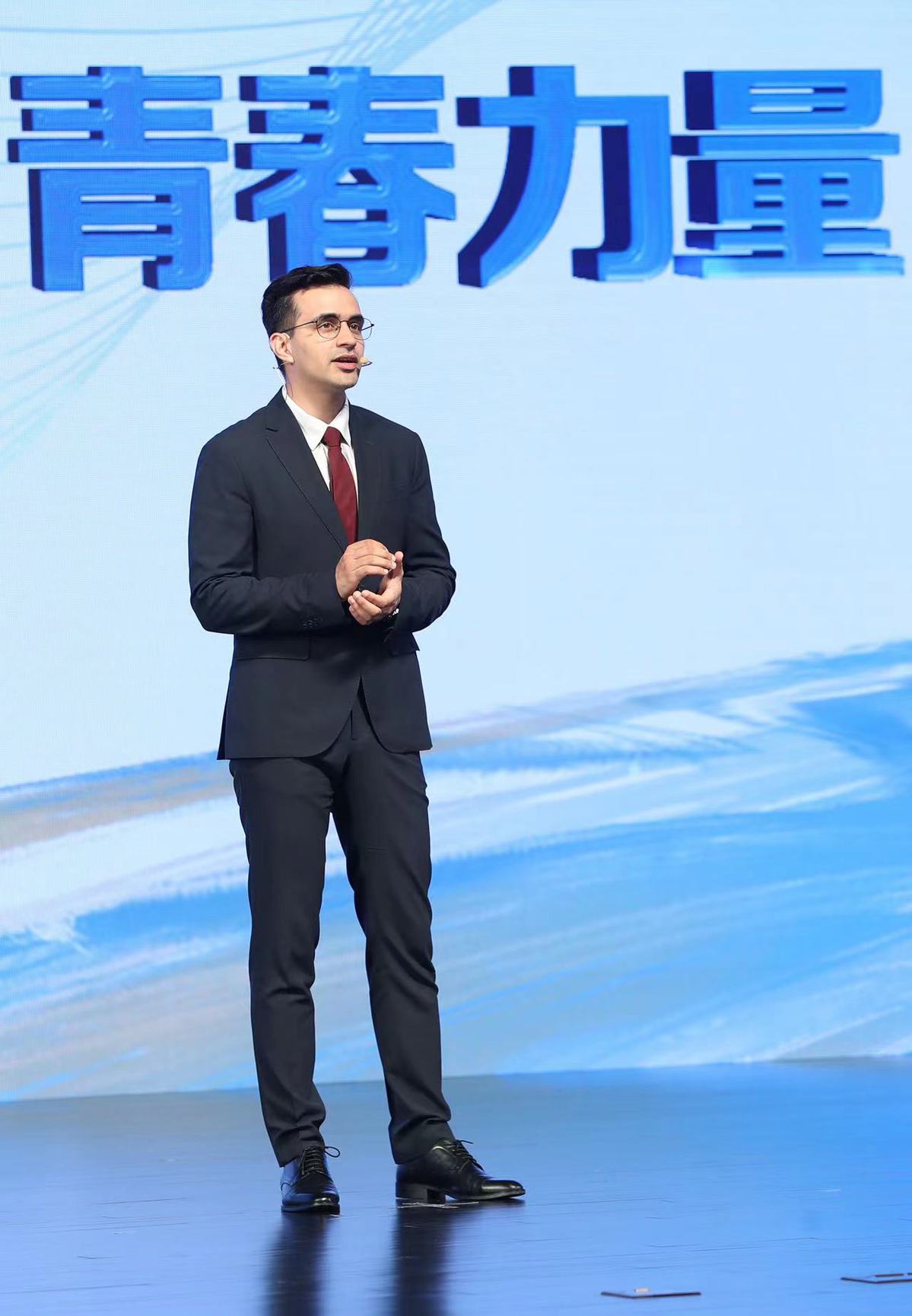
Companies crave young people with deep knowledge about China to reap the benefits of the China-proposed Belt and Road Initiative, a young business leader said on Friday.
That is due to their potential to catalyze cross-border cooperation, and ultimately bring about "impactful changes", said Wahed Ahmadzai, a China-educated entrepreneur from Afghanistan.
He was among the first foreigners to register a business in the Beijing Chaoyang Free Trade Zone, which was created in 2020.
Ahmadzai first came to China in 2014 on a Chinese government scholarship to study international economics at the University of International Business and Economics in Beijing.
He later was enrolled in an MBA program at UIBE.
While speaking at a Vision China event in Taicang, Jiangsu province, Ahmadzai said that his experience in academia and business informed him of the "pivotal role" played by young people in bringing about "impactful changes", especially those who have studied in China.
The group can help bridge the gap between the world's second largest economy and the rest of the world, he said, adding that they also exhibit potential to spearhead influential projects and facilitate cross-border cooperation.
"Their mobility catalyzes the flow of knowledge, resources and innovation, transcending borders," he said.
Upon his arrival in 2014, the Afghanistani student got to know the Belt and Road Initiative, which had been put forward by President Xi Jinping a year earlier. The proposal was an homage to the ancient Silk Road.
He said the initiative resonated deeply with him due to his home country's historical ties to the Silk Road.
The initiative, according to Ahmadzai, "symbolizes not only economic prosperity but also global connectivity," and it has rekindled hope for Afghanistan's reemergence as a pivotal player in trade and civilizational exchanges.
In 2016, Ahmadzai was appointed vice-secretary-general of UIBE International Alumni Association.
In that position, he has noticed that the BRI is central to most discussions across the vast alumni network, which is composed of 1,000-plus graduates in about 30 countries.
This year marks the 10th anniversary of the BRI.
"As the BRI expanded to encompass economic, trade, cultural and innovation exchanges, I recognized that the youth are not only the backbone of the labor market but also ambassadors for connectivity and dialogue between diverse ecosystems and regions," he said.
Opportunities created by the BRI galvanized companies to hire youth with a background in China to help navigate their operations here and beyond, he added. "They serve as enablers, bringing unique skills and perspectives, enhancing problem-solving and propelling organizations onto the global stage."
Ahmadzai said more needs to be done to equip entrepreneurial youth with necessary resources and tools to fulfill their potential.
To that end, Ahmadzai said he and his partners have worked with industrial parks to establish incubation and support centers.
"Let's collaborate, innovate and empower the youth, for they are the architects of the world's future," he said.
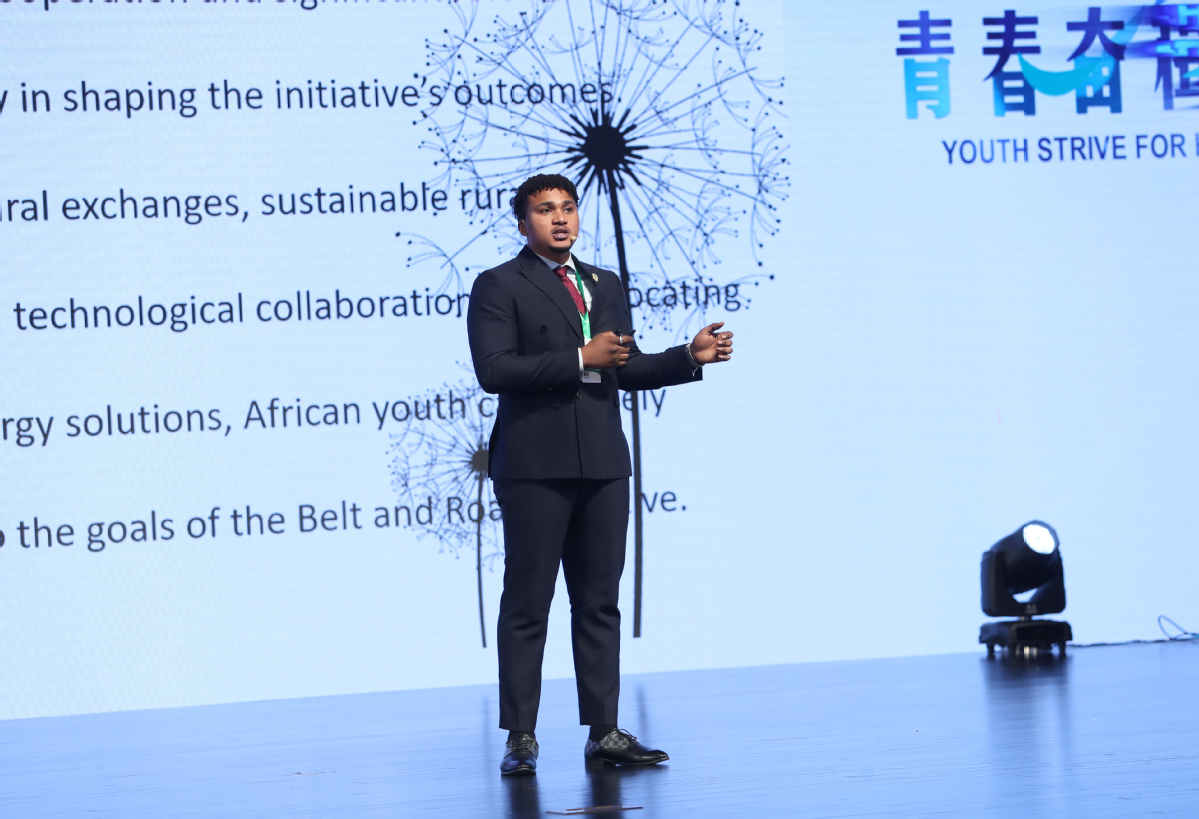
African youth have huge potential in bolstering exchanges in areas such as technology and rural development between the continent and China under the framework of the Belt and Road Initiative, said an African student studying in Beijing.
They have a significant role to play in shaping the China-proposed initiative's outcome, Uzodinma Gerlof, a doctoral candidate at Beijing Foreign Studies University from Nigeria, said at a Vision China event in Taicang, Jiangsu province, on Friday.
Gerlof, also a member of the China Africa Youth Federation, said his involvement in the organization, coupled with personal interactions with his Chinese counterparts and visits to several cultural heritage sites in China, had helped deepen his understanding of Chinese traditional values and practices.
In turn, he wishes to serve as a cultural ambassador for Africa.
"By sharing our knowledge of Africa's rich cultural heritage, we can contribute to cultural exchange initiatives within the Belt and Road Initiative," he said.
Gerlof's stay in China has offered him a front-row experience of China's economic vibrancy and technological know-how.
"As I traveled across this vast nation, I marveled at the infrastructure projects unfolding before my eyes," he said.
Citing his participation in the First Boao Summit for Anhui Merchants, a business event, the African student said he met ambassadors, diplomats and merchants from over 28 countries, and felt the immense potential for collaboration and trade that the BRI offers.
"These experiences have broadened my perspective on the opportunities for collaboration and investment that the Belt and Road Initiative presents," he said.
In his capacity as a China Africa Youth Federation member, Gerlof paid a recent visit to a rural part of Beijing.
"We gained insights into the history of rural transformation and development in China and saw firsthand how the integration of agriculture, culture and tourism contributes to rural revitalization," he said.
"Armed with this knowledge, we can advocate for similar sustainable development approaches in rural areas across Africa," he said.
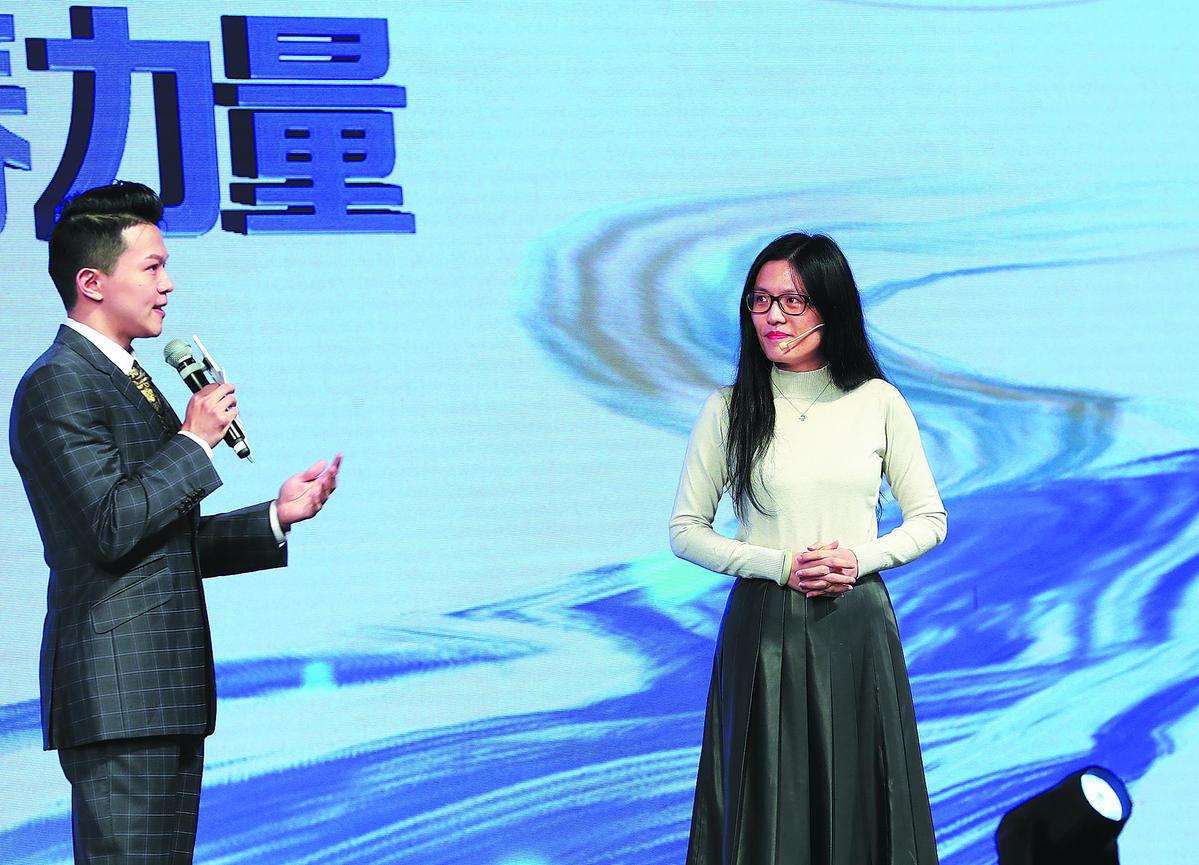
Being the youngest person to win the women's world championship in international chess, Chinese player Hou Yifan compared life with pawns — each moved forward to affect small things — and called on Friday for the young generation to empower the building of the Belt and Road Initiative.
Though limited in power and large in numbers, Hou spoke about her affection for pawns, the weakest chess piece, though as they move forward step by step they acquire the potential to be promoted to the strongest once reaching the opponent's back rank.
"I find this parallel to life itself — once you make a decision, there's no turning back, and even a humble pawn holds boundless potential," she said.
Ever since she started to learn chess at six years old, Hou has remained modest and upheld "an unwavering belief in reaching new heights and continually pushing the boundaries of human potential," be it victory or defeat.
At the 19th Asian Games in Hangzhou, Hou experienced a hard-earned triumph against the Kazakhstan team and faced challenges brought by 17-year-old rising star Umida Omonova from Uzbekistan. Confronting difficulties, she was more mature and composed than last time and relished the excitement of sports and competition with unwavering determination.
Based on the thinking of many little moves making a miracle, Hou deemed that the BRI was also composed of various small parts in infrastructure and trade cooperation as well as cultural and educational exchanges, among which chess culture was indispensable.
In such cases, organizing chess competitions and popularizing chess among the public could serve as a more engaging way to nurture cultural exchanges and mutual learning at the international level.
As an educator, she was pleased with the wealth of emerging talent in the realm of chess and spoke highly of the young generation who could potentially elevate this sport to new heights.
"Young individuals are not mere spectators or beneficiaries of the Belt and Road Initiative; they are its architects and ambassadors," Hou said.
Li Menghan contributed to this story.
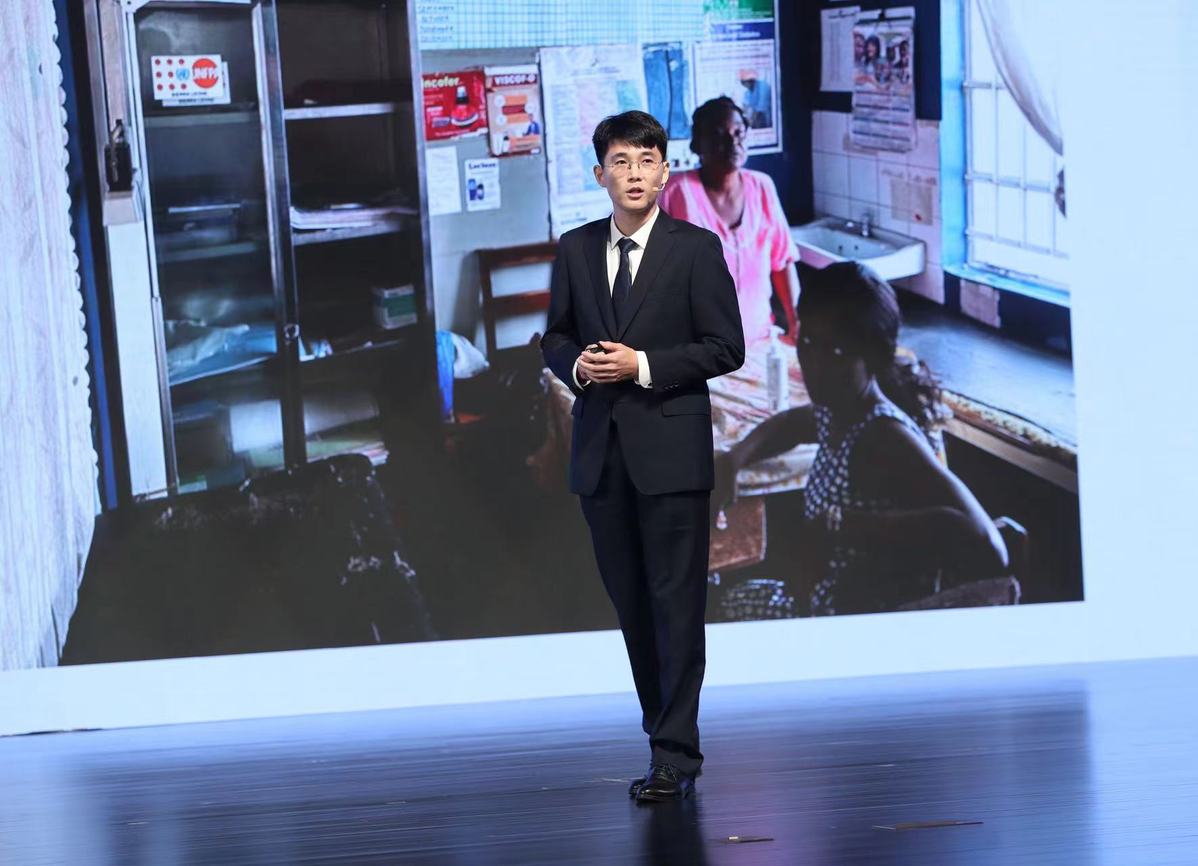
A young Chinese gynecologist who volunteered in West Africa has witnessed how the Belt and Road Initiative has promoted women's health in some of the world's most impoverished countries.
Tian Qi, a doctor from Hunan Provincial Maternal and Child Healthcare Hospital, traveled to Sierra Leone in July with several of his colleagues to treat cervical cancer.
The trip was sponsored by the Global Development and South-South Cooperation Fund, which was set up by the Chinese government and the United Nations Population Fund.
One of the fund's aims is to curb preventable maternal deaths in the global south, where thousands of BRI projects have benefited tens of millions of people.
In Sierra Leone, cervical cancer is the second-most common cancer among women, Tian said at a Vision China event on Friday in Taicang, Jiangsu province. The theme of the event was "Youth Generation: Powering the Future of the Belt and Road".
He said that more than 500 women in the country are diagnosed with the disease each year and about 70 percent of the patients die within a year of their diagnoses.
However, Tian stressed that the seemingly fatal condition — overwhelmingly caused by HPV, or human papillomavirus — can be easily prevented via a mix of vaccination campaigns and early screening.
"No women should die from cervical cancer," he said.
Tian, who received training in the United States and Germany, said he had confronted many unexpected challenges performing his duty in the poorly resourced West African country.
"The power went off frequently, even during surgical procedures, and doctors sometimes needed to use flashlights to complete surgeries," he said.
At the hospital where he volunteered, the colposcope — the device used to examine the cervix, vagina and vulva for signs of disease — had been broken long before he arrived.
To fix the problems, Tian and his colleagues repaired the device and opened a screening clinic — which is free of charge — and trained local nurses and midwives to perform screening checkups.
"But in the beginning, no one heard about this clinic and very few patients came for screening," he said.
To reach the younger generation, Tian said, they resorted to TikTok, Instagram and other popular social media services. They also reached out to some local internet influencers to bolster publicity, which turned out to be a successful strategy.
"The clinic quickly filled up with patients," he said.
To make the exchanges sustainable, the visiting Chinese doctors proposed to create the Online Support System, which allows local health practitioners to consult with their Chinese counterparts on the internet.
"Through these experiences, I've come to realize that the BRI from China will enable a new generation of young doctors to engage in the cause of improving women's health in Africa with their expertise and cutting-edge technologies," he said.

How to tap the potential of youth and make their talent flourish? Yasir Masood, a Pakistani researcher, journalist and strategic analyst of the Belt and Road Initiative, has emphasized the constructive role media organizations play in fostering understanding, engagement and collaboration among the young generation.
In 2013, Masood went on an official trip to Beijing as a visiting scholar.
He immersed himself in Chinese culture and resolved to align his life with China.
Astonished at the ancient civilization and its values, he described the journey as an adventure that "redefined his life from scratch" and decided to work on Chinese affairs.
Seeing that many people were held back from traveling abroad due to lack of opportunities, Masood proposed that media organizations could take an active part in informing the youth, developing their interests and unleashing their creative potential.
As the old saying goes: Seeking common ground while reserving differences.
Masood proposed to develop cross-cultural understanding, tolerance and collaboration within the framework of the BRI upon its ultimate goal of inclusive globalization, which could bring about new perspectives to the table and nurture long-lasting friendships and partnerships.
He quoted China Daily, the largest English language newspaper in China, as an example by saying that the paper effectively disseminated information to young people on the opportunities and benefits of the BRI.
"Youth are the engine that propels any civilization forward," he added.
Seeing the strong interaction between cultivation of the youth and use of their innovation, Masood suggested empowering youth by implementing education reform, which included ensuring their access to education, increasing vocational training and encouraging entrepreneurship.
"Young people need to be given the tools they need to become engaged participants in the development of the BRI as a result of our actions," he said.
In addition to necessary information, knowledge and skills, a qualified participant needs to be mentally well-equipped.
Every era has its own responsibilities. In an age featuring deepening digitalization and intensifying global concerns, Masood called on the young generation, frequently referred to as "digital natives", to make full use of their technological expertise and out-of-the-box thinking to find the way out of the environmental dilemma and lead the way to sustainable development.
This required not only personal endeavor, but also the investment of the government and stakeholders.
Besides material support and preferential policy on infrastructure construction and innovation programs, Masood considered it vital to provide places for free debate and youth involvement in decision-making.
He named a variety of channels catering to the interests of the youth, such as publications and social media platforms, which are the main fronts of media, as well as seminars and workshops, which can be held with the collaborative effort of media and educational institutions.
"Our youth are the future's torchbearers, and their empowerment is essential to the Belt and Road Initiative's success," he said.
Li Menghan contributed to this story.
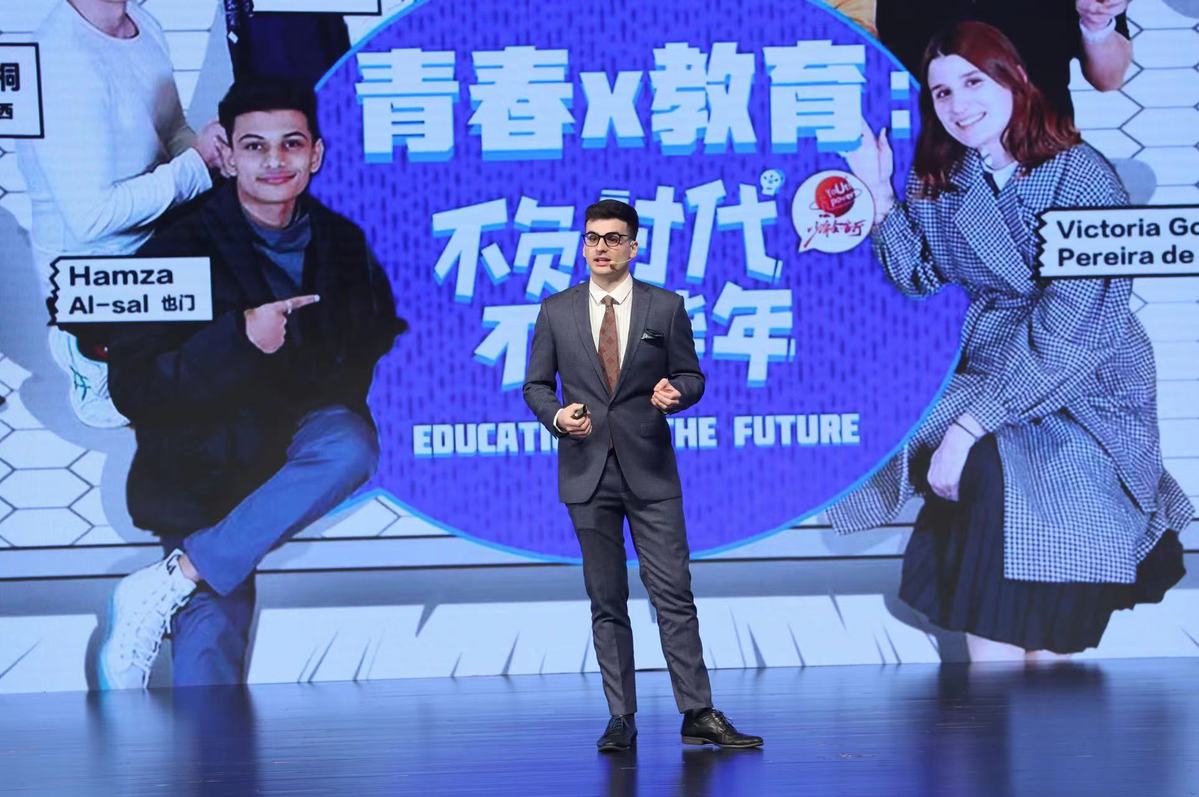
French IT graduate finds his way to preserve, invigorate China's heritage
Alexandre Guery, a 27-year-old tech blogger from France, shared his stories of traveling with global youth in China, during which he recognized the pivotal role of technology in preserving and invigorating cultural heritage.
Being a participant of "Youth Power", organized by China Daily and focusing on the interests and ideas of Generation Z (those born after 1995 and into the 2000s), Guery acquired the opportunity to gather with young people from all around the world, go on trips to different places in China and have in-depth dialogues on global issues.
During his two-year stay, the city of Zhengzhou, Henan province, with its museum housing invaluable artifacts and ancient relics, left a deep impression on Guery. This glimpse into China's long history made Guery think about how to preserve the ancient civilization and promote these priceless treasures.
As a master's graduate in information technology from ESIEA, Guery was keen on advanced technology and proposed it as a feasible solution in the digital age, since it could not only assist in the exterior maintenance and restoration work of historical sites and artifacts, but also inject momentum into traditional arts, crafts and culture.
Guery introduced the Shanghai-based developer's Genshin Impact as an example of successful innovation and described it as "a bridge to share Chinese culture".
"In Genshin Impact's virtual world, I saw many foreigners, from Europe, Asia or America, discovering Chinese culture for the first time," said Guery.
The Chinese-made open-world role-playing game Genshin Impact was listed among the top downloads upon release in 2020. The success of the game can be partly attributed to the fascinating Chinese culture it embraces, such as shadow puppetry, Beijing Opera and celadon wares, and partly attributed to its global vision, as it also integrates elements of European, African and various other cultures in scene construction and character design.
"This fusion shows how modern technology and creative minds can create tools that connect cultures and have a significant impact faster than ever before," he said.
Li Menghan contributed to this story.
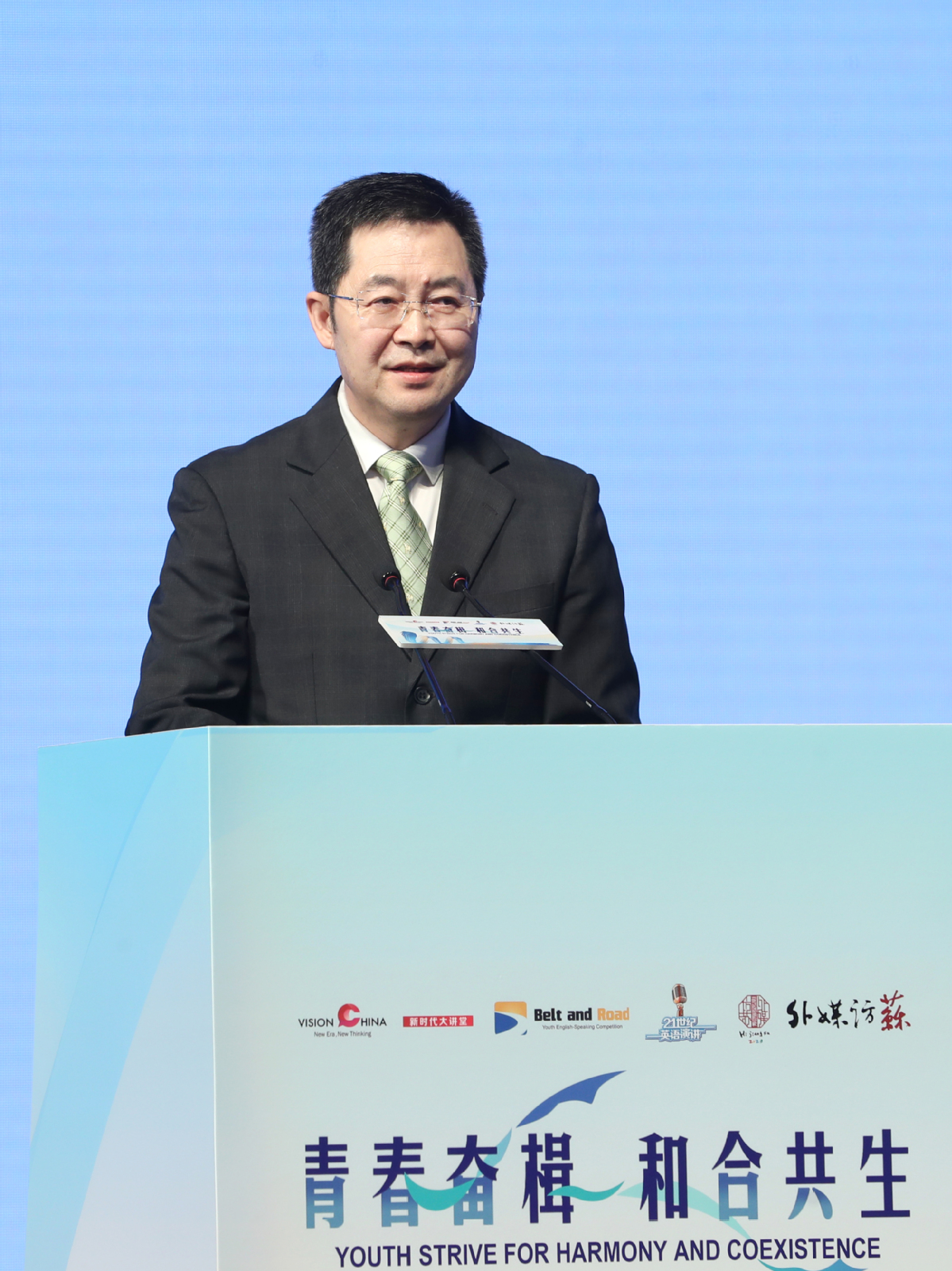
Youth empowerment and the potential contributions of young professionals to the Belt and Road Initiative were highlighted at the Vision China event on Friday in Taicang, Jiangsu province.
Under the theme "Youth Generation: Powering the future of the Belt and Road", Vision China sought to highlight the crucial role that young businesspeople, doctors, scholars, media professionals and athletes from Belt and Road countries can play in shaping the initiative's future trajectory.
The event, hosted jointly by China Daily, the Publicity Department of the Communist Party of China Jiangsu Provincial Committee and Suzhou Municipal People's Government, aimed to inspire collective action and collaboration among the youth.
The attendees, representing different nations involved in the BRI, explored avenues for generating innovative ideas and fostering cross-cultural understanding.
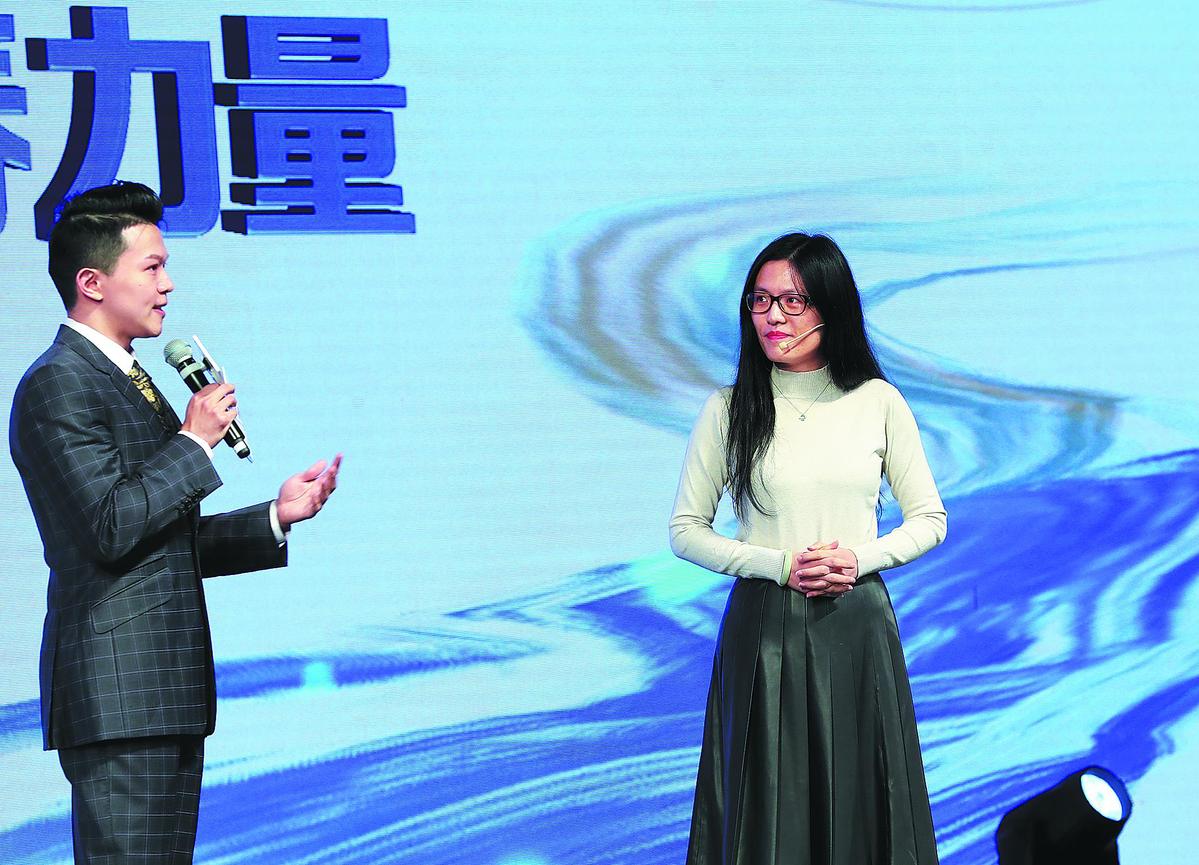
Qu Yingpu, publisher and editor-in-chief of China Daily, said that over the past decade, the achievements of Belt and Road construction are evident, making it the most popular international public good and the largest platform for international cooperation.
"Any vibrant civilization is fluid and open. The diverse contemporary world has been formed through the exchanges and mutual learning of human civilizations," Qu said.
"China Daily has been striving to encourage the global Generation Z to enhance mutual understanding, deepen friendship, and grow together," he said. "We hope that the global youth in the new era will unleash their power, demonstrate their vitality, and gather their strength."
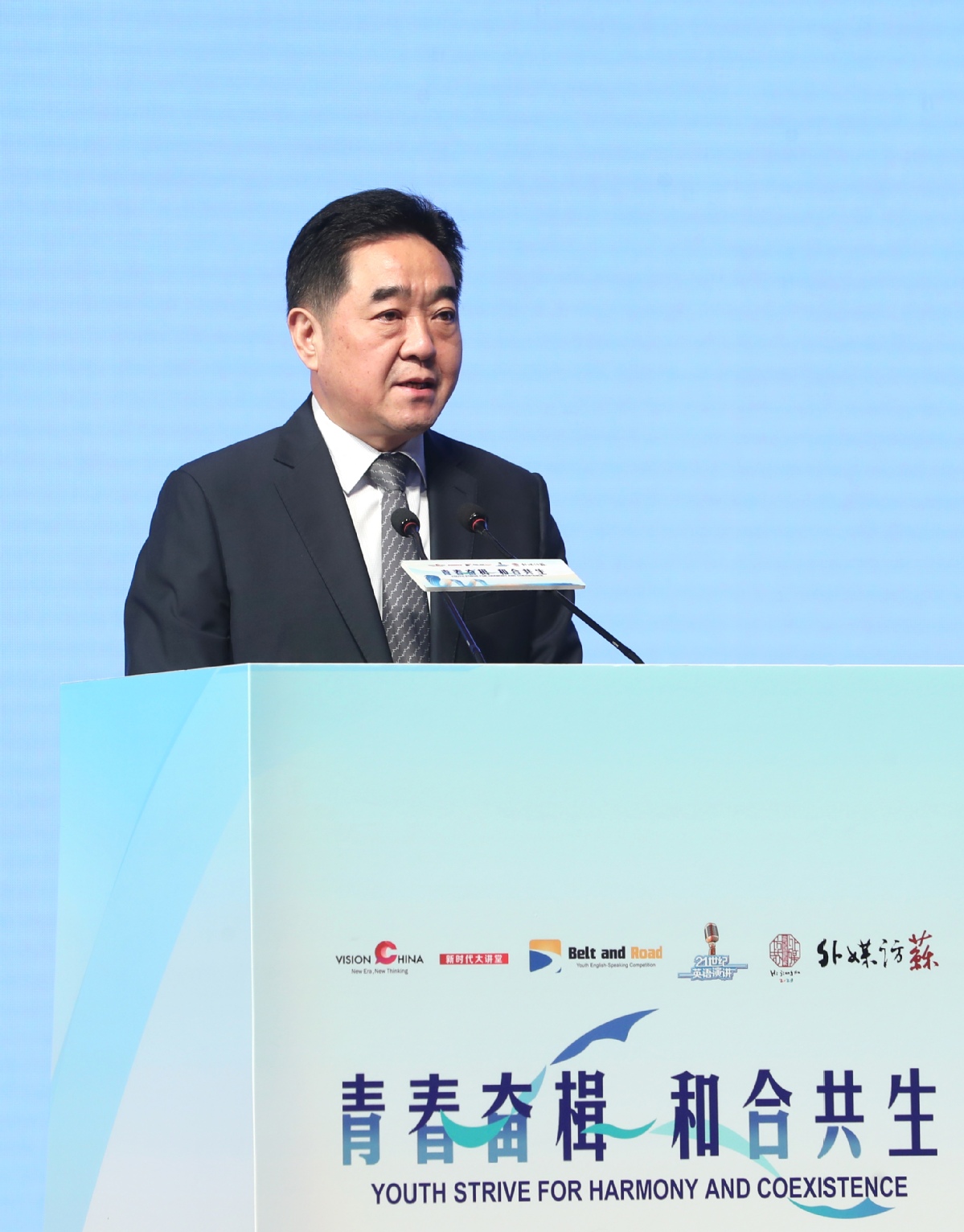
Zhang Aijun, a member of the Standing Committee of the CPC Jiangsu Provincial Committee and head of the provincial publicity department, encouraged the younger generation to actively engage in international communication and tell China's stories in a diverse and youthful way that resonates with people from various countries.
He said that Jiangsu province will strive to be in the forefront of China's international communication efforts and become a vivid narrator of China's modernization story.
As the initiative celebrates its 10th anniversary, with its focus on nurturing talent, facilitating knowledge exchanges and fostering international cooperation, Vision China provides another platform for the promotion of the BRI.
Wang Xiaoming, deputy director-general of the Institute of West Asian and African Studies at the Chinese Academy of Social Sciences, said that the youth are the hope of any nation, and their communication with each other is essential for the future of the world.
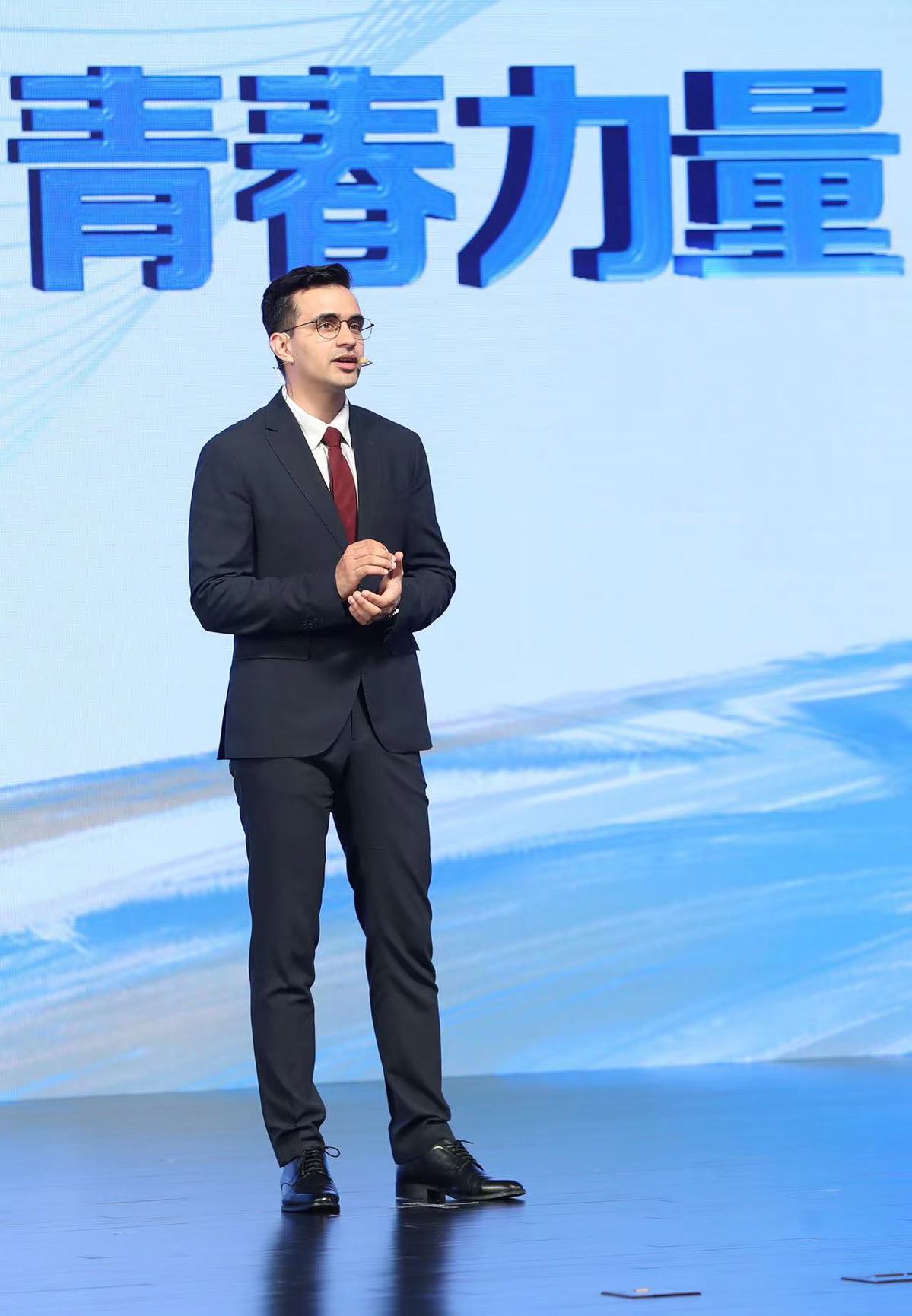
Wahed Ahmadzai, from Afghanistan, said that young people are connectors, bridging the gap between China and the rest of the world, leaders inclined to build communities and spearhead impactful projects, and conduits for cross-border cooperation.
"Their role forms the foundation that will bring China's vision and the world's vision to fruition," said Ahmadzai, the founder of NHUB, one of the first foreign enterprises registered in the Beijing Chaoyang Free Trade Zone.

Yasir Masood, an international relations analyst, academic, journalist and Belt and Road scholar from Pakistan, said that it is vital to build a culture inside the BRI framework that is inclusive and diverse.
He said that the youth need to be empowered to confront global concerns such as climate change and sustainable development, and must feel responsibility and keep themselves engaged in shaping the policies and projects of the BRI.
To mark the 10th anniversary of the BRI and promote the building of a community with a shared future for mankind, China Daily has planned a series of exchange activities, including the global finals of the Belt and Road Youth English Speech Contest and the awards ceremony of the "21st Century Cup" English Speaking Competition.
China Daily has organized five annual "Belt and Road" Youth English Speech Contests, attracting tens of thousands of participants from 51 countries and regions. The contest takes perspectives of the youth to tell the world true, comprehensive, and multidimensional stories about China and the world.
On Friday, the launch ceremony of the 2023 "Hi Jiangsu" foreign media visiting event was also held in Taicang, which invited foreign media professionals to visit the province and witness its latest achievements in modernization.
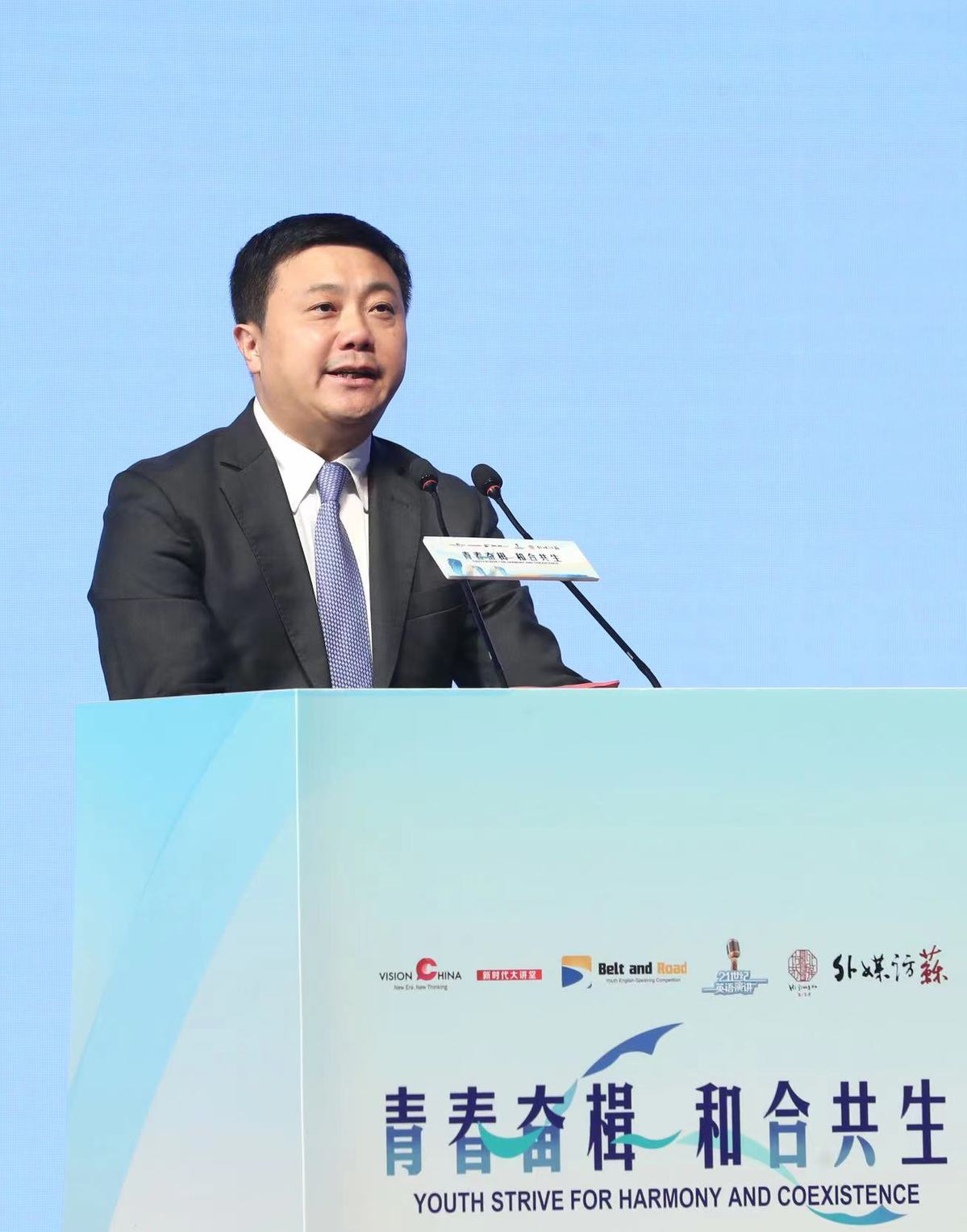
Wang Xiangyuan, Party secretary of Taicang, said that young people are the driving force for building the Belt and Road and promoting international friendship, adding that the Belt and Road Youth English Speech Contest provides a platform for young friends from various countries to explore Chinese culture, showcase their talents and exchange experiences.
On Monday, the establishment of the Belt and Road Languages and Cultures Network will also be announced in Beijing. It will fill the gap in cooperation mechanisms for language education in the BRI countries, laying a solid foundation for promoting language exchanges and cultural communication.
